Strange, funny, great protagonist, stunning ending.

Have you ever read a book that’s reveals to you the ending, the factual ending, but doesn’t tell you why, just gives you little clues about the why, just pushes you and pushes you to get to the end because you have to know WHY everything just happened?
Of course you have, if you read mysteries.
But this book, oh this book.
Don DeLillo once said:
"When I think of highly plotted novels I think of detective fiction or mystery fiction, the kind of work that always produces a few dead bodies. But these bodies are basically plot points, not worked-out characters. The book’s plot either moves inexorably toward a dead body or flows directly from it, and the more artificial the situation the better. Readers can play off their fears by encountering the death experience in a superficial way. A mystery novel localizes the awesome force of the real death outside the book, winds it tightly in a plot, makes it less fearful by containing it in a kind of game format.” (http://www.theparisreview.org/intervi...)
Muriel Spark wrote this novel as a direct counter to what normally happens in a mystery novel. And it’s fast, weird, FUNNY, and brilliant.
Read it and know this: the main character is infuriating but she’s funny in her comments, behaviors and thoughts. Things get grim, but I read this so fast and loved it.
[also posted on Goodreads.com]
The Blue Fox
THE BLUE FOX reads like Hemingway crossed with a more recent Jayne Anne Phillips novel. Cut into three sections, the first is a series of precise beats following a hunter who tries to take down a fox. The middle section bursts forth with life and connectivity, loss, death, and reveals just who is the hunter we were first introduced to. The final section provides an excellent resolution, if one takes joy in reading about the suffering of a cruel and heartless man. I’d say more but don’t wish to spoil things.
Read this if you love crisp sentences and want to see how a story can be told slightly out of order to great effect. [same review posted on Goodreads]
with a lie. and each
speaker of the so-called common language feels
the ice-floe split, the drift apart
as if powerless, as if up against
a force of nature."
E! Entertainment
 Really fascinating and some sharp descriptions. Love the juxtipostional (word?) nature of The Housewives section.
Really fascinating and some sharp descriptions. Love the juxtipostional (word?) nature of The Housewives section.
Worst. Person. Ever.
 Woah. This is a dark dark book. It's the funniest I've read in a long time. I laughed constantly; I have a pretty messed up sense of humor and maybe you, dear reader, do not.
Woah. This is a dark dark book. It's the funniest I've read in a long time. I laughed constantly; I have a pretty messed up sense of humor and maybe you, dear reader, do not. Reminded me of the 2nd half of Rick Moody's THE FOUR FINGERS OF DEATH.
Also, the cartoon ARCHER.
Give it a shot. Just don't expect a warm and fuzzy feeling at any point. Haha
Not a Drop to Drink
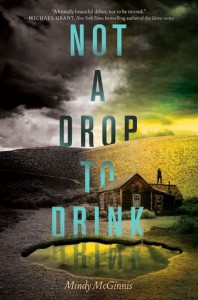 Mindy McGinnis’s NOT A DROP TO DRINK satisfied all my interests in a novel about an apocalyptic world. First, she creates a believable reality wherein water is worth killing over. Then, she channels Jack London and Gary Paulson with her smart scene crafting, setting her main character Lynn up with just the right amount of skills to survive without being perfect. (then she outdoes London, in particular, by giving us a reason to hope, without having Lynn discover the cure for cholera and water shortages).
Mindy McGinnis’s NOT A DROP TO DRINK satisfied all my interests in a novel about an apocalyptic world. First, she creates a believable reality wherein water is worth killing over. Then, she channels Jack London and Gary Paulson with her smart scene crafting, setting her main character Lynn up with just the right amount of skills to survive without being perfect. (then she outdoes London, in particular, by giving us a reason to hope, without having Lynn discover the cure for cholera and water shortages).Basically, I enjoyed everything about this book because McGinnis refuses to succumb to cliches. Anything can happen in this book -- both bad and good. But the cast, especially Lynn, her mother, and Stebbs, is well written, flawed, and real.
Death, Dickinson, and the Demented Life of Frenchie Garcia
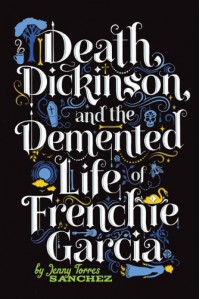 Frenchie Garcia is one of the best characters I’ve read in a while thanks to a classic technique: the exploration of mortality. Instead of focusing on her own, however, Sanchez constructs a story wherein Frenchie ponders the suicide of a guy named Andy with whom she spent one adventurous night. Frenchie’s own mental state is fragile enough to suggest she, too, might take herself out of the world but the more compelling threat is what her own rationale might be. She’s in search of a deeper truth not to life, but to ending life.
Frenchie Garcia is one of the best characters I’ve read in a while thanks to a classic technique: the exploration of mortality. Instead of focusing on her own, however, Sanchez constructs a story wherein Frenchie ponders the suicide of a guy named Andy with whom she spent one adventurous night. Frenchie’s own mental state is fragile enough to suggest she, too, might take herself out of the world but the more compelling threat is what her own rationale might be. She’s in search of a deeper truth not to life, but to ending life. A satisfying story with great exchanges of dialogue, a sprinkling of Emily Dickinson, and a very effective exploration of coping with death.
Charm & Strange
 intense and smart. to say too much is to ruin it; the narrator’s convinced he’s a monster. His friends don’t believe him. None of them are prepared for the truth.
intense and smart. to say too much is to ruin it; the narrator’s convinced he’s a monster. His friends don’t believe him. None of them are prepared for the truth.
In the Shadow of Blackbirds
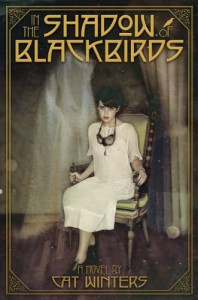 A tremendous book that's complex without being unwieldy. The historical details contribute to the sense that anything in this book can happen (an does). The fantastic main character, Mary, has great interactions with her aunt lending greater satisfaction to the emotional turmoil. Check this one out!
A tremendous book that's complex without being unwieldy. The historical details contribute to the sense that anything in this book can happen (an does). The fantastic main character, Mary, has great interactions with her aunt lending greater satisfaction to the emotional turmoil. Check this one out!
The Flame in the Mist
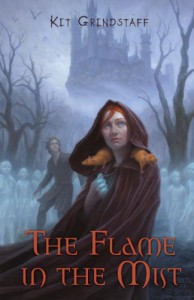 A fantasy story needs a memorable character, some sidekicks, and malevolence. The Flame in the Mist has all of these things and more. Grindstaff’s sentences are as fantastic as her story, where a young girl must protect herself from her “family” who wish to steal her burgeoning powers. A great stand-alone fantasy for people with series-fatigue (though a sequel is in the works). This reads well both for middle grade and young adult readers -- but let’s be honest: adults love stories with brave characters against overwhelming odds.
A fantasy story needs a memorable character, some sidekicks, and malevolence. The Flame in the Mist has all of these things and more. Grindstaff’s sentences are as fantastic as her story, where a young girl must protect herself from her “family” who wish to steal her burgeoning powers. A great stand-alone fantasy for people with series-fatigue (though a sequel is in the works). This reads well both for middle grade and young adult readers -- but let’s be honest: adults love stories with brave characters against overwhelming odds.And helpful ratusses as sidekicks.
Canary
 I finished this back in August, but for some reason my review never materialized. Still, it's never to late to review a great book, and CANARY is certainly wonderful and fascinating.
I finished this back in August, but for some reason my review never materialized. Still, it's never to late to review a great book, and CANARY is certainly wonderful and fascinating.While comparisons to SPEAK are certainly apt, Alpine easily carves her own path in a story about family as much as its about the fragile choices her protagonist makes in order to forge an identity in a new school. Further, the focus of this novel, despite what title and hook might suggest, is not sexual assault, though it certainly plays a huge role. The story focuses more successfully on the social realities of a high school and weaves in the broken family trauma so that the ultimately climax ends up being quite satisfying. Basically, this book does not rely on easy solutions to the problems offered.
Also worth noting are the poetry inter-chapters, some of which demand to be read multiple times and none of which feel forced. These are organic expressions from the narrator, not adornments added by the author.
Where Things Come Back
 Tried to read this on my Nook last year and, well, my Nook and I didn't really like reading together. So, I picked up a paperback copy at an indie bookstore and read it over the course of 24 hours. What works here? For me: everything. A story about a sixteen year old kid named Cullen, Whaley boldly and successfully branches the narrative out, weaving it all back together in the final twenty-five pages or so.
Tried to read this on my Nook last year and, well, my Nook and I didn't really like reading together. So, I picked up a paperback copy at an indie bookstore and read it over the course of 24 hours. What works here? For me: everything. A story about a sixteen year old kid named Cullen, Whaley boldly and successfully branches the narrative out, weaving it all back together in the final twenty-five pages or so. To try and explain, I'd have to spoil everything, even some things that happen early enough. Let me try it this way: Cullen's town seems cursed and the parallel between a missing person and the potential return of a long-extinct woodpecker travel along a fascinating path until the conclusion begs you to make an interpretive choice that made me think of stories as random as Kafka's "Metamorphosis" and Tim O'Brien's best works. Basically, it's not that Whaley leaves you without an answer as to what everything meant and what Cullen's faced with going forward. In fact, it's more satisfying than a neatly tied up ending.
In some ways I'm sorry I waited so long to get back to this book, but maybe we read books at certain times for certain reasons. Who cares -- check this one out and prepare yourself for some excellent friendship between Cullen & Lucas, amazing exploration of loss and uncertainty, and the tricky nature of a small town groping for its big moment.
Speak
 After meeting with a class of 7th and 8th graders who had been energetically debating Speak by Laurie Halse Anderson, I decided I needed to try and find a way to read it sooner rather than later.
After meeting with a class of 7th and 8th graders who had been energetically debating Speak by Laurie Halse Anderson, I decided I needed to try and find a way to read it sooner rather than later.This novel seems like a standard recommendation for anyone who wishes to read YA or write it. I believe it's an important book not only for women (teens and adults alike), but also for boys and men as it shows the difficulty of being the object of sexual abuse and the damage that occurs over the long term. Considering the high-profile events of the past year involving rape and the battle for women's legal rights, a book like this can broaden a male reader's understanding of how male behavior and aggression, as well as female silence, need to be discussed rather than dismissed.
Anderson's style and thus Melinda's voice make this a great example of how one can pace a serious novel without losing the dramatic elements. Short paragraphs allow for a satisfying momentum but also frame a number of key emotions and scenes rather than allowing them to be lost in the shuffle. Melinda has moments to analyze her situation, her feelings, her disappointing friend Heather, her parents -- but none of these moments extends for pages on end, so the reader is never caught wondering if Melinda is a whiner, even if she can be excused for being one.
In fact, by the end of the novel I realized that many of her comments and thoughts about people around her -- her parents, for instance -- were not simply facts but thoughts from an embattled, depressed mind. Put simply, we can't take her comments at face value, because they are warped by her mental state. For instance, she refers to her father as Rambo, one who constantly berates her for her grades. This is factually true, but how aggressive was he "for real"? I believe that she felt he was uncaring, but when his caring side reappears one has to wonder if she's forgiven him or if she saw a version of him that was more angry than he truly was.
Her mother, perhaps unforgivably, says that people who commit suicide are cowards. By the end, I'm not sure whether to hate her mother (personally I find dismissal of suicidal thoughts and depression to be repugnant) or to wonder how the conversation between Melinda and her mother truly went.
The key here is not to doubt Melinda's honesty. If anything, readers are the only one she speaks to until the end, so we are clearly trusted enough to get information from her. But I believe Anderson has given a stellar example of how difficult it can be for a depressed person, also a victim of assault, to effectively process the world around them and effectively communicate facts when feelings, difficult feelings, have taken over.
While some might suggest the ending and the lack of exploration of the villain might devalue the impact or complexity of the novel's exploration of sexual assault, I suggest that not one text can encompass the variety of responses to such a serious issue. Further, the villain has been defined by his actions and unlike other villains, there's nothing about his behavior that can be interpreted in multiple ways. Consider that many villains can be called the hero of their own story, that he or she believes they are doing something right even if the actual hero and the audience know it to be wrong. (Easiest example: Darth Vader thinks he's doing something right by wiping out the rebels; because we root for Luke Skywalker, we don't believe it).
In this case, the villain can't be understood as anything other than a purely bad person. And I don't think that's a flaw in the narrative because Melinda would not see him as anything other than evil because of what he does. The key to the novel is who Melinda trusts, how people respond to her when she acts and speaks, and who supports her no matter what.
(I'd suggest A.S. King's novel on bullying EVERYONE SEES THE ANTS and Matthew Quick's forthcoming FORGIVE ME, LEONARD PEACOCK as complementary texts for readers wishing to understand the internal damage caused by abuse/assault involving male victims.)
The structure relies easily on the high school 4 marking period system, with holidays and the associated school events helping to carry the load of momentum. Basically, I love how Anderson allows for time to PASS in this novel without feeling the need to baste her character in day-after-day of silent misery. What ends up happening is that the weight of Melinda's silence, the very burden of her experience, is drawn out over the course of the entire school year so that, by the time we get to the climax, you truly feel her hopelessness. Plus, you really have no idea what she could do to combat her vocal paralysis.
The use of art in this text is also an excellent trope that many YA novels use (Anderson predating them all here). This is not a complaint or a criticism. In fact, I am never surprised when wounded characters use art to find some kind of strength (the more recent SYMPTOMS OF MY INSANITY shows how overwhelming art can be, not simply because it shakes loose mucky, difficult feelings, but because the labor of art is intense and can be just as difficult to deal with as the problems that cause one to flee to the art room).
The Symptoms of My Insanity
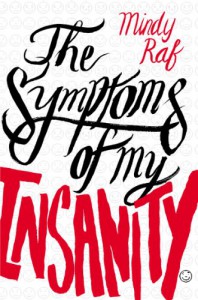 A strong story that manages to smartly tie together body image, parental illness, the power of art, and the frustration (and downright villainy of young men in a digital world), Mindy Raf's first novel offers plenty to both teen and adult readers. For teens, there's a funny narrator who's self-image issues don't snub out the personalities of those around her (ie, she's not self-absorbed to the point of isolation). For adults, we can see how overwhelming day-to-day life can be even without the perils of "real world" problems like sick parents and sexually aggressive teenage boys.
A strong story that manages to smartly tie together body image, parental illness, the power of art, and the frustration (and downright villainy of young men in a digital world), Mindy Raf's first novel offers plenty to both teen and adult readers. For teens, there's a funny narrator who's self-image issues don't snub out the personalities of those around her (ie, she's not self-absorbed to the point of isolation). For adults, we can see how overwhelming day-to-day life can be even without the perils of "real world" problems like sick parents and sexually aggressive teenage boys. One sequence in particular that I loved because it felt so real was when Izzy ends up going to a college party (with great hesitation) only to end up at a diner with her friends because the party is lame. This, despite the fact that a party a year prior has caused Izzy's closest friend some serious issues.
A definite winner that can be easily recommended.












